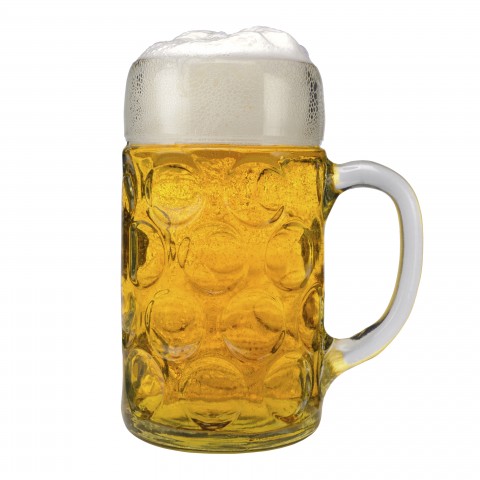
Proverbs are popular sayings that provide a little dose of wisdom—a truth that is, sometimes, so obvious that it’s overlooked.
If you really want your language skills to shine, knowing some popular German proverbs is a great way to start. And of course, it will also help you fit in with the German locals and better understand their culture!

In Germany, there’s a great variety of wisdom-infusing sayings—whether we’re talking about a lot of sausages, some bears and rabbits running around in forests, or some serious-sounding, deep stuff!
As we say, “There is no time like the present.” So let’s get to it. These thirty popular German proverbs will add versatility and color to your spoken language, so that even locals will mistake you for a native.
- → By the way, you might also enjoy our vocabulary list of Essential Idioms That Will Make You Sound Like a Native Speaker!
 Table of Contents
Table of Contents
- 6 Funny German Proverbs
- 8 German Proverbs About Food and Drinks
- 6 German Proverbs Related to Nature
- 10 Beautifully Wise German Proverbs
- Conclusion
1. 6 Funny German Proverbs
Let’s face it, Germans are not known for being the most humorous people in the world… I can assure you, though, that they do have some pretty funny proverbs they like to use!
“Laughter is the best medicine,” we say in English, so let’s start by having a look at some lighthearted German-language proverbs and idioms!
Wer rastet, der rostet.
Literal translation: He who rests grows rusty.
English equivalent: You snooze, you lose.
To remain true to their engineering and car-building reputation, when Germans get lazy or inactive…they get rusty! This will make it harder to start being productive again.
Krummes Holz gibt auch gerades Feuer.
Literal translation: Crooked logs also make straight fires.
If you’re cold during the German winter, crooked logs will be just fine…no need to find perfect ones. So stop looking for perfection and make do with what’s available!

Des Teufels liebstes Möbelstück ist die lange Bank.
Literal translation: The devil’s favorite piece of furniture is the long bench.
English equivalent: Never leave until tomorrow what you can do today.
In German, to put something “on the long bench” means to put it off until later. This proverb warns us to be careful about procrastination, because you don’t want to mess with the devil’s favorite piece of furniture!
It also has an alternative version, closer to the English equivalent: Was du heute kannst besorgen, das verschiebe nicht auf morgen. (Literally: “What you can get done today, don’t move it until tomorrow.”)
Selbst ist der Mann. / Selbst ist die Frau.

Literal translation: Self is the man. / Self is the woman.
English equivalent: Self do, self have.
This is your proverb if you like DIY. Say it to yourself (or to a friend) after you’ve managed to do something without help from anyone. It’s pretty empowering!
Ich kriege so eine Krawatte. / Ich kriege so (dicken) einen Hals.
Literal translation: I get such a tie! / I get such (thick) a neck.
English equivalent: It really annoys me / winds me up!
Both variants are often accompanied by the gesture of putting a hand around one’s own neck.
In Germany, apparently, you get a necktie or a thick neck when something annoys you. Personally, I do understand the comparison…do you?
Bis über beide Ohren verliebt sein.
Literal translation: To be over both ears in love!
English equivalent: To be head over heels in love.
Just change the head and heels for both of your ears, and it means you’ve found someone really, really special!
2. 8 German Proverbs About Food and Drinks
Food might not be the first thing you think about when planning a trip to Germany, but the country has as much of a food culture as anywhere else in Europe. The cuisine is tasty, original, and different in every region.

As you can imagine, you’ll find a lot of sausage-related idioms. But you’ll also find German food proverbs talking about cookies, soups, and (of course) beer!
Die beleidigte Leberwurst spielen.
Literal translation: To play the offended liver sausage.
This one could actually have been in the previous section, but here it is: If you’re behaving like an offended liver sausage, it means you’re throwing a tantrum or overreacting to something. The good thing is that being called a liver sausage might make you forget what you were on about, and just laugh it out!
Der Hunger kommt beim Essen.
Literal translation: Appetite emerges while eating.
According to this proverb, you’ll only realize how hungry you are after you’ve started eating. But the proverb can apply to other things, too. For example, do you want to learn German but don’t feel so hungry for it? Start learning and the appetite will come!
Sich die Wurst vom Brot nehmen lassen
Literal translation: To let someone take the sausage off your bread
This is a warning to stand up for yourself. Don’t let anyone take the sausage off your bread. You’re too good to be taken advantage of.
Das ist mir Wurst.
Literal translation: That is sausage to me.
I warned you about the sausage content, so don’t complain. If something is ‘sausage to you,’ it means you couldn’t care less about it! (Which is strange, as Germans do seem to care about sausages…)
Um den heißen Brei herumreden
Literal translation: To talk around the hot soup/porridge
English equivalent: To beat around the bush
Well, what do you do when the soup’s hot and you can’t eat it just yet? This phrase is used when someone is talking and talking, without ever getting to the point.
Du gehst mir auf den Keks.
Literal translation: You’re getting on my cookies.
English equivalent: You’re getting on my nerves.
Use this phrase when someone annoys you, as if you were eating a cookie and they tried to take it out of your hands!
Das ist nicht mein Bier.

Literal translation: That’s not my beer.
English equivalent: That’s not my business.
This phrase is used when you don’t want to get involved in something you have nothing to do with. Not your beer, not your problem!
Dienst ist Dienst und Schnaps ist Schnaps.
Literal translation: Work is work and liquor is liquor.
Germans are known to be very diligent workers…but there’s no mixing of business and pleasure! Everything has its time. So work hard, play hard!
3. 6 German Proverbs Related to Nature
If you’ve been to Germany, you’ll certainly know how important it is for the locals to spend some time in touch with nature. This is reflected in the proverbs they use in their daily lives.
Bears, horses, rabbits, and forests…here we come!
Da steppt der Bär.

Literal translation: There steps the bear.
You can use this phrase when referring to a party you really want to go to. If even the bears will start dancing, it means it’s gonna be good! Be careful, though, as it’s often used sarcastically!
Wenn der Reiter nichts taugt, ist das Pferd schuld.
Literal translation: If the rider is no good, it’s the horse’s fault.
English equivalent: A bad workman always blames his tools.
Someone who has done their job poorly will always try to blame it on outside circumstances (in this case, poor horses), rather than admit their lack of skills.
Wer zwei Hasen auf einmal jagt bekommt keinen.
Literal translation: He who chases two rabbits at once will catch none.
English equivalent: He who follows two hares catches neither.
Concentrate on one task at a time, or you’ll end up not doing either of them properly.
Kümmere Dich nicht um ungelegte Eier.
Literal translation: Don’t worry about eggs that haven’t been laid yet.
English equivalent: Don’t cross your bridges before you come to them.
In other words, don’t worry about problems before they arrive. Be them eggs or bridges, just chill for now.
Du siehst den Wald vor lauter Bäumen nicht.
Literal translation: You don’t see the forest for all the trees.

This is something along the lines of the Zen proverb: “When the sage points at the moon, the fool looks at the finger.” Look beyond and see the bigger picture! And also, don’t think too much; just see what’s there, the obvious!
Bäume wachsen nicht in den Himmel.
Literal translation: No trees grow into the sky.
This German saying suggests that there are natural limits to growth and improvement. So actually, don’t reach for the sky…
4. 10 Beautifully Wise German Proverbs
This is the longest list, so let’s admit it: Germans are pretty wise. Yes, they like to be funny sometimes, enjoy their food and drink, and love to spend time in nature. But when it comes to philosophical statements, they have no rivals!
After all, German philosophers and thinkers are some of the most famous around the world. It’s easy to see why, if they’ve grown up repeating these beautiful German sayings.
Let’s look at some of these German proverbs and their meanings in English. (Although they just sound wiser spoken in German!)
Aller Anfang ist schwer.
Literal translation: All beginnings are hard.
This one is pretty self-explanatory: Beginnings can be very hard, but it will get easier.
Anfangen ist leicht, Beharren eine Kunst.

Literal translation: Starting is easy, persistence is an art.
Hmm…apparently, starting can be the easy part and keeping it up the hard bit. Let’s say it depends on the situation!
Man muss die Dinge nehmen, wie sie kommen.
Literal translation: You have to take things the way they come.
We all know life never happens exactly as we expect it to. So relax, and try to accept whatever comes. Make the best of it, rather than always wishing for things to be different.
Übung macht den Meister.
Literal translation: Practice is what makes a master.
English equivalent: Practice makes perfect.
Practice, practice, practice! It’s the only way to master virtually anything.
Wer A sagt, muss auch B sagen.
Literal translation: He who says A also has to say B.
If you commit to something, commit all the way!
Taten sagen mehr als Worte.
Literal translation: Actions say more than words.
English equivalent: Actions speak louder than words.
In German, actions don’t necessarily speak louder…they’re just more chatty!
Aus Schaden wird man klug.
Literal translation: Failure makes smart.
Nobody likes to screw up, but failure is necessary for learning. If you don’t make mistakes, you’ll never get better!
Das Billige ist immer das Teuerste.
Literal translation: The cheapest is always the most expensive.
This is a philosophical way of inviting you to invest in quality, and not only in terms of money. If something is too cheap or too easy to get, it will probably end up costing you much more later on!
Erst denken, dann handeln.
Literal translation: First think, then act.
Wise and clear. Think before you act!
Gut Ding will Weile haben.
Literal translation: Good things take time.
If you’re an impatient person, we have bad news for you. Germans believe that if you want something to be done well, you need to wait for it. In other words: take your time, enjoy the process, and don’t rush things!
5. Conclusion
“All good things must come to an end.”
But it’s not really the end, is it? There’s so much more to learn about the German language!
As they say, “Practice makes perfect.” So keep practicing your German skills on GermanPod101.com! With all the features we offer (podcasts, videos with transcriptions, word lists, a dictionary, and more), you’ll pick up this beautiful and interesting language in no time.
And remember: What makes a master? Practice, practice, practice!
Which of these German proverbs or idioms is your favorite, and why? Let us know in the comments!












